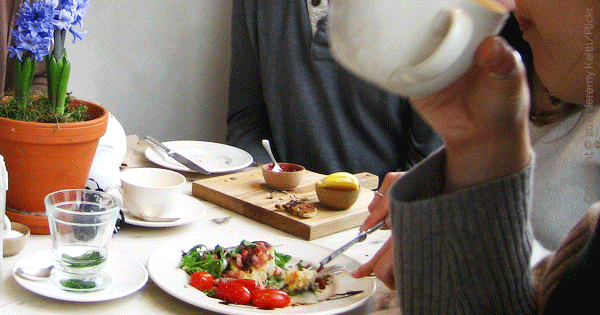Advertisement
Eating out and watching your weight can be tricky, especially when there is not a nutritional fact sheet next to every food item. That doesn't mean you can't enjoy a brunch out with your friends--you can discern quite a few things just from the way the menu describes the items.
Erin Winterhalter, a registered dietitian at MacDonald Center for Obesity Prevention and Education at Villanova University in Philadelphia, explains the warning signs "healthy" menu items are deceptively unhealthy.
That's not to say that you should avoid these foods--just be aware that these buzzwords do not mean that foods are healthy, low-calorie, low-fat, or nutrient-rich.
Check out the list below:
1. It's labeled gluten-free. Just because it's free of grains does not mean that it is healthier--in fact, most of the time, it means it is more processed. Unless you have celiac disease, avoid foods like gluten-free mac 'n cheese and flourless cake; they are huge calories bombs with few nutritional benefits. "Unless you have celiac disease or you're sensitive to gluten, gluten-free foods are no safer for your diet or your body than the regular stuff," Winterhalter says.
2. Avoid food described as "creamy." "While this could describe a frothy sauce or dressing that is blended for an extra-smooth mouth feel, it probably refers to an item made with milk or cream, which means it could contains a lot of saturated fat," Winterhalter explains. Keep in mind that even if it is made with non-dairy cream alternatives, like coconut milk, it could still carry the same calories bomb.
3. One of the ingredients of the dish is maple- or honey-glazed. This is a sugar bomb waiting to happen. "These natural sugars may sound appealing and less refined than white sugar, but they still contain unnecessary calories that give sugar-sweetened candy and soda a bad rep," Winterhalter says.
4. It's fat-free. According to Winterhalter, "low-fat often means low-flavor. To compensate, chefs add sugar, which is no better (and probably worse) than the healthy fats found in options like balsamic vinaigrette."
5. It's organic. Organic does not necessarily mean it is prepared in a healthy way. "The term itself refers to how a food is grown or produced: without chemical fertilizers, insecticides, herbicides, and antibiotics (in the case of livestock)." It does not indicate, however, how much butter, sugar, or unhealthy fats are on your plate, so be aware!
6. It's locally sourced. Locally sourced foods mean that the restaurant is using produce from local farmers, meaning it takes less time to get from the farm to your plate, which is great, because produce begins to lose nutrients after it is picked. "The thing is, there are lots of factors that figure into the vitamin, mineral, fat, and calorie content of fruits and vegetables, including how they are prepared," Winterhalter says. "So nutritionally, it doesn't really matter whether you grow an artichoke in your own backyard — deep-fry it, and it could sop up just as much fat as an order of fast-food fries. Don't be fooled!"
7. It's raw. "While raw food advocates claim that cooking kills enzymes in food and reduces the food's nutrients, science suggests that cooking some foods (like tomatoes) can actually help your body absorb more of that food's nutrients," Winterhalter says.
8. It's "all-natural." The USDA explains that "natural foods" are minimally processed and contain no artificial ingredients--but that does not mean low-calories or low-fat. You know that all-natural bacon cheese burger? It's still dripping in unhealthy fats.
What do you think about this list? Let us know your thoughts and reactions in the comments!
Copyright © 2010 Jeremy Keith/Flickr




